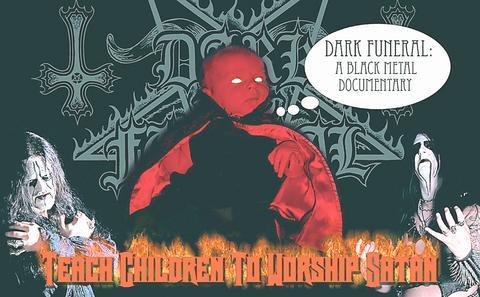Although its a party/arts event at Huashan organized by lao-wai, this is a far cry from the "foreigner head-shaking party" that tabloids enjoy getting steamed up about. It is, in fact, the Urban Nomad Film Festival (城市游牧影展), now back at Huashan for the second year.
This time round, a more complete selection of films will be shown, and these will be more focused on a single theme. In total, there will be 25 films (experimental, shorts, documentaries and mockumentaries) screening over two days.

PHOTO COURTESY OF URBAN NOMAD
The Friday event begins with three experimental shorts. Tony Wu (吳俊輝), from Taiwan, a frequent participant in international short film or experimental film festivals, will present his latest work Making Maps (製造地圖). Wu's experimental style makes use of found footage, animated images and optical printing.
In Making Maps, he uses these methods to talk about pornography, specifically blood and semen. For Wu, the pornographic images he weaves through this 21-minutes is a way of creating a physical and psychological map of human beings.
Another Taiwan entry is Lin Hongjohnn's (林宏璋) film about Taiwan's UFO cult. Lin, as the nephew of UFO cult leader, Chen Heng-ming, has unique access to the true believers.
The main event on Saturday is the Taiwan premiere of an underground film Redneck Vampire, a mockumentary by Mike Anderson. In the film, Anderson tracks down a man in central Alabama, who claims to be a redneck vampire, and explores his life of drugs, sex and immortality. The film proved a big hit on the Internet with its hilarious play on racial and class stereotypes. Even Ann Rice, the author of Interview with the Vampire, has signed on at the film's Web site.
The mockumentary is followed by the rockumentary session of three film. Dark Funeral, a film documenting the Taiwan performance of a Swedish black metal band. It explores their views on satanic cults and church burning. The film was previously selected for the 2002 New York Underground Film Festival.
For film-loving people, Urban Nomad will be an event to spot some innovative or odd creations of independent filmmaking. And for those who just want to chill out, there will be live music today and tomorrow nights, accompanied by film footage of surfing, punk rock concerts and a remix of Hitchcock's classic film Psycho.
The Urban Nomad Film Festival will run tonight and tomorrow at the Huashan Arts District (華山藝文特區) starting at 8pm. Huashan is located at 1 Pateh Rd., Sec. 1,Taipei (台北市八德路一段1號). Tickets are NT$200 for one day or NT$300 for both days. Tickets available at the door.

Dissident artist Ai Weiwei’s (艾未未) famous return to the People’s Republic of China (PRC) has been overshadowed by the astonishing news of the latest arrests of senior military figures for “corruption,” but it is an interesting piece of news in its own right, though more for what Ai does not understand than for what he does. Ai simply lacks the reflective understanding that the loneliness and isolation he imagines are “European” are simply the joys of life as an expat. That goes both ways: “I love Taiwan!” say many still wet-behind-the-ears expats here, not realizing what they love is being an

Google unveiled an artificial intelligence tool Wednesday that its scientists said would help unravel the mysteries of the human genome — and could one day lead to new treatments for diseases. The deep learning model AlphaGenome was hailed by outside researchers as a “breakthrough” that would let scientists study and even simulate the roots of difficult-to-treat genetic diseases. While the first complete map of the human genome in 2003 “gave us the book of life, reading it remained a challenge,” Pushmeet Kohli, vice president of research at Google DeepMind, told journalists. “We have the text,” he said, which is a sequence of

Every now and then, even hardcore hikers like to sleep in, leave the heavy gear at home and just enjoy a relaxed half-day stroll in the mountains: no cold, no steep uphills, no pressure to walk a certain distance in a day. In the winter, the mild climate and lower elevations of the forests in Taiwan’s far south offer a number of easy escapes like this. A prime example is the river above Mudan Reservoir (牡丹水庫): with shallow water, gentle current, abundant wildlife and a complete lack of tourists, this walk is accessible to nearly everyone but still feels quite remote.

It’s a bold filmmaking choice to have a countdown clock on the screen for most of your movie. In the best-case scenario for a movie like Mercy, in which a Los Angeles detective has to prove his innocence to an artificial intelligence judge within said time limit, it heightens the tension. Who hasn’t gotten sweaty palms in, say, a Mission: Impossible movie when the bomb is ticking down and Tom Cruise still hasn’t cleared the building? Why not just extend it for the duration? Perhaps in a better movie it might have worked. Sadly in Mercy, it’s an ever-present reminder of just